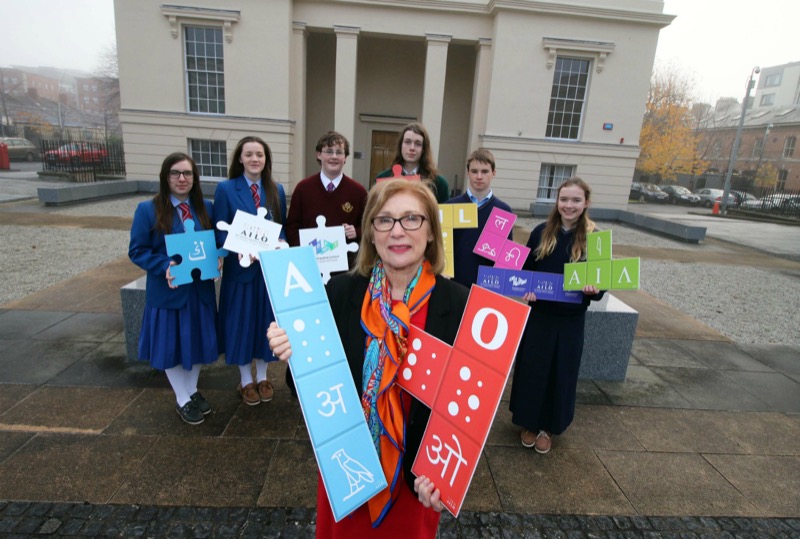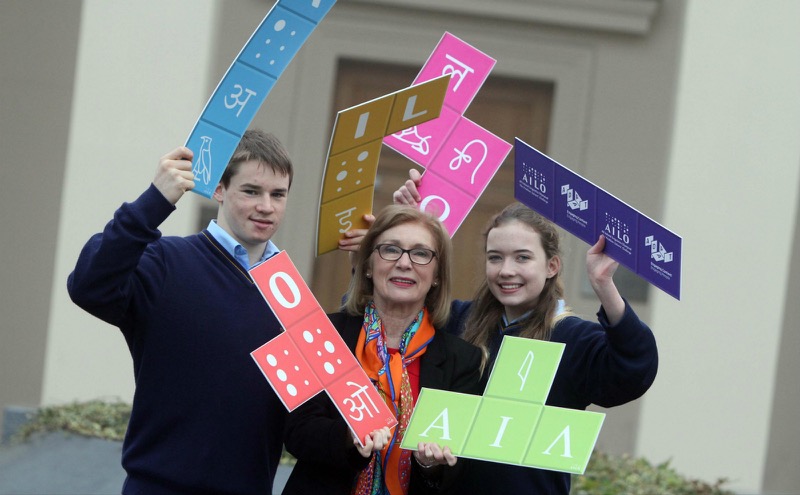Search for Ireland’s Top Young Problem-Solver Begins
Posted on: 20 November 2014
Minister for Education and Skills, Jan O’Sullivan, launched the 2015 season of the All Ireland Linguistics Olympiad (AILO) in the search for Ireland’s best young problem solvers. The prize for the top four decoders is the opportunity to represent Ireland at the International Linguistics Olympiad in Bulgaria, in July 2015. Schools can sign up for the contest at http://www.adaptcentre.ie/ailo.
AILO challenges secondary school students to engage in code-breaking to decipher complex puzzles in unfamiliar languages. Typical puzzles include deciphering numerical spy codes and decoding ancient scripts. The contest is run by the ADAPT Centre, which is funded by Science Foundation Ireland.

Speaking at the launch at the Department of Education and Skills, Minister O’Sullivan encouraged students to sharpen their code-breaking skills. She said: “The ability to solve problems and complex puzzles is invaluable for all students throughout their education and career paths. The All Ireland Linguistics Olympiad inspires students to think outside the box and develop their problem-solving skills. I encourage students to take part in AILO 2015 and test their minds against the world’s languages.”
Professor in Computer Science at Trinity College Dublin, and CEO of AILO organisers ADAPT, Vincent Wade, said: “With over 9,000 participants to date, AILO is committed to developing problem-solving techniques in secondary school students in Ireland. These 21st century skills are indispensable for future in careers across computing, media, communications and business.”
Earlier this year, the OECD’s Programme for International Student Assessment reported that Irish students are “average” when it comes to creative problem solving skills for tackling real-life problems. AILO aims to help Irish students to hone these valuable skills in a fun, interactive manner.

Luke Gardiner, from Gonzaga College in Dublin, who represented Ireland in China at the International Linguistics Olympiad (ILO) last year, said: "The experience of taking part in the linguistics olympiads, attempting such fascinating problems and meeting people from all over the world at the IOL, was wonderful. It was particularly enjoyable to work through the Armenian team problem with the other members of the Irish team."
The Olympiad is run by the ADAPT Centre, the global centre of excellence for digital content and media innovation led by Trinity College Dublin, in partnership with Dublin City University, University College Dublin and Dublin Institute of Technology. Recent investment of €50 million by Government and industry has seen the creation of the new ADAPT Centre that will revolutionise how customers and companies engage with each other digitally. Leading-edge innovations will enable delivery of the right content to the right customer, at the right time, in their preferred format and language, and on the device of their choice.
AILO’s primary aim is to enhance students’ problem solving skills in order to prepare them for high-tech careers in Ireland’s multi-billion euro digital content sector. Launched by the ADAPT partners in 2009, the contest has attracted more than 9,000 secondary school students to date. This year sees the introduction of a junior category to encourage younger students (aged 15 or younger) to take part.
The top 100 students from the qualifying round will progress to the national final, which will be held at Dublin City University on 24th March 2015. The overall top four performers will go on to represent Ireland at the International Linguistics Olympiad in Bulgaria in July 2015.
2015 is already a record-breaking year for the contest as more than 3,000 students have registered. Schools can register online until the end of January at http://www.adaptcentre.ie/ailo.
